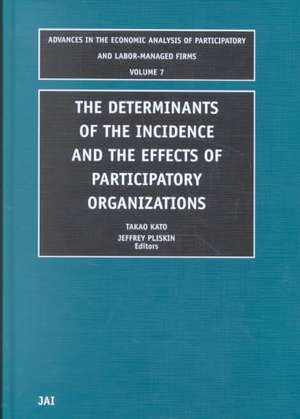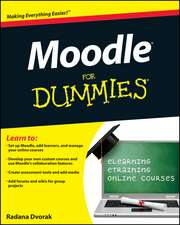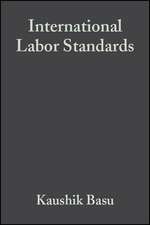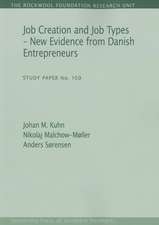Determinants of the Incidence and the Effects of – Theory and International Comparisons
Autor Takao Kato, Jeffrey Pliskinen Limba Engleză Hardback – 31 ian 2003
The paper by Tor Eriksson introduces a new survey of participatory employment practices in Danish firms, and connects these practices to productivity gains for the firm and wage gain for workers.
José Alberto Bayo-Moriones, Pedro Javier Galilea-Salvatierra, and Javier Merino-Díaz de Cerio introduce a new telephone survey of participatory employment practices in 965 manufacturing establishments in Spain, and investigate whether these practices lead to gains for the firm and workers.
While the above two papers focus on new institutions of workplace governance, the next paper studies a traditional institution of workplace governance, i.e., trade unions. Chris Doucouliagos and Patrice Laroche conduct a meta-analysis of the effect of unions on productivity growth.
All three papers so far concentrate on non-financial aspects of governance. The next two papers tackle such financial aspects. The contribution by Agustin Ros is an empirical study of the effects of employee ownership on effort/shirking and horizontal monitoring based on rich survey data collected by the author on an employee owned firm and 6 comparable private firms.
The paper by Everaert and Hildebrandt contributes to the literatures on transition economies and participatory firms by examining the determinants of the incidence of soft budget constraints (SBCs), in particular enterprise ownership structure (including different forms of private ownership).
The next three papers turn to the issues of the determinants of participation. Andrew Pendleton, Erik Poutsma, Jos Van Ommeren and Chris Brewster use a unique cross-national survey of financial participation schemes in 2,506 establishments in 14 EU countries, and try to study the determinants of the adoption of such schemes.
Christopher Adams uses rich data on 1,153 product line workers in 162 British private sector manufacturing establishments to examine the use of group incentives (profit sharing or employee share ownership) and worker participation in decision making (specifically over the range of tasks performed).
The paper by Nicholas Wilson, Hao Zhang, and Andrew Robinson is an empirical study that examines hypotheses arising from a transaction cost economics (TCE) framework to explain employee share ownership.
The last two papers are theoretical contributions. Jan Erik Askildsen and Norman Ireland carefully develop a model of bargaining by a union and a firm over future benefits (e.g., a defined benefit pension) when workers may not receive these benefits either because the firm goes out of business before the benefit is to be paid or the worker leaves the firm before the benefit is vested.
In his paper "Comparative Systems, Destructive Trade and World Distributive Justice," one of the pioneers on the broad field of participatory and labor managed firms, Jaroslav Vanek, extends earlier work by presenting an analysis of the impact of international trade in today's globalized economy.
Preț: 929.60 lei
Preț vechi: 1207.27 lei
-23% Nou
Puncte Express: 1394
Preț estimativ în valută:
177.87€ • 186.22$ • 147.18£
177.87€ • 186.22$ • 147.18£
Carte tipărită la comandă
Livrare economică 05-19 aprilie
Preluare comenzi: 021 569.72.76
Specificații
ISBN-13: 9780762310005
ISBN-10: 0762310006
Pagini: 284
Dimensiuni: 155 x 234 x 432 mm
Greutate: 0.58 kg
Ediția:New.
Editura: Emerald Publishing
ISBN-10: 0762310006
Pagini: 284
Dimensiuni: 155 x 234 x 432 mm
Greutate: 0.58 kg
Ediția:New.
Editura: Emerald Publishing
Cuprins
Foreward (D.C. Jones). Introduction (T.Kato, J.Pliskin). Empirical Advances I: The Effects of Institutions of Governance at the Corporate and Workplace levels. 1. The effects of New York practices - Evidence from employer-employee data, (T. Eriksson). 2. Participation, cooperatives and performance: An analysis of Spanish manufacturing firms (J.A. Moriones,et al.). 3. Unions and productivity growth: A meta-analytic rewiew, (C. Doucouliagos, P. Laroche). 4. Do ESOPs motivate employees? Worker effort, monitoring and participation in employee-owned stock ownership plans, (A.J. Ros). 5. On the causes of soft budget constraints: Firm-level evidence from Bulgaria and Romania, (G. Everaert, A. Hildebrandt).
Empirical Advances II: The Determinants of Participation. 6. The incidence and determinants of employee share ownership and profit sharing in Europe (A. Pendleton, et al.). 7. Use of profit sharing when workers make decisions: Evidence from a survey of manufacturing workers (C. Adams). 8. Specific human capital and employee ownership (N. Wilson et al.).
Theoretical Advances. 9. Union-firm bargaining over long-term benefits (J.E. Askildsen, N. Ireland). 10. Comparative Systems, destructive trade and world distributive justice (J. Vanek).
Empirical Advances II: The Determinants of Participation. 6. The incidence and determinants of employee share ownership and profit sharing in Europe (A. Pendleton, et al.). 7. Use of profit sharing when workers make decisions: Evidence from a survey of manufacturing workers (C. Adams). 8. Specific human capital and employee ownership (N. Wilson et al.).
Theoretical Advances. 9. Union-firm bargaining over long-term benefits (J.E. Askildsen, N. Ireland). 10. Comparative Systems, destructive trade and world distributive justice (J. Vanek).













